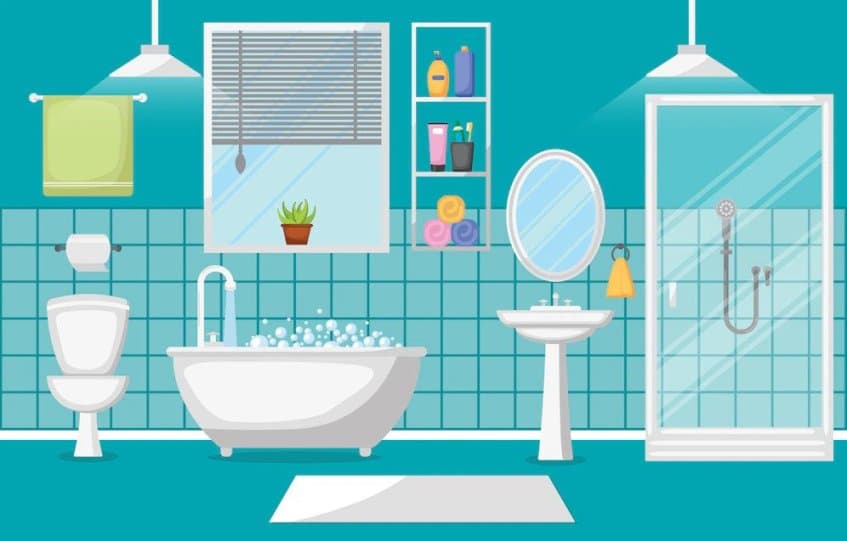Elderly people possess the risk of accidents due to unexpected falls. And around 80% of such cases happen in the bathroom, and it leads them to go to the emergency room. That is why it is essential to ensure no such occurrence happens because it can happen any time, even to the fittest of the older person.
The best way to ensure their safety is to provide a safer bathroom setting and environment. The place to take a bath is one of them. But what type of bathing setup is the most suitable for them? Should it be a shower or a tub?
Though it depends on the person’s condition, you should also know both bathing setups’ pros and cons before starting. So, let me give you an overall run-through to determine which one is better for the senior person you are caring for.
Are Showers Or Tubs Better For Seniors?
Senior people need special care and careful observation. Even the fittest-looking senior can suffer from disastrous accidents because of a tiny slip (no pun intended). That is why you need to consider installing a shower or a tub to make the bath time easier for them.
Showers require the person to stand to take a bath. However, it is easier to clean oneself in that position. At the same time, not all elderly people are strong enough to stand in the shower for such a long time.
Tubs are better for people who have limited movement. The person can get comfortable there, and there is a lesser chance of slipping. On the other hand, getting into a tub might be difficult for elderly people, and they can get chilly in the water.
Pros & Cons Of Showers
Here are the pros and cons of having showers.
Pros Of Showers
- Space-Saving: If your house does not have a wider or lavish space, there is no better option than installing a shower. They do not take up much space, and you can install one in a narrow space as a person can bathe by standing there.
- Easy To Clean: No, I’m not talking about cleaning the shower area right now because that is not why we are discussing this at the moment. Bathing in the shower gives one plenty of space to clean themselves easily.
- Hygienic: If the elderly person is bathing after a few days due to poor health conditions, using the shower is a hygienic option. The caregiver can also reach all the areas of the seniors to give them a better bath.
- Wheelchair-Friendly: If the senior person has movement issues and someone is assisting him or her, showers are an ideal choice. Unlike tubs, they do not have to get into it and can also make it wheelchair accessible.
Cons Of Showers
- Risk Of Slipping: Unless a safety feature like a grabbing bar is installed, using a shower can be risky for ill seniors. That is why showers are not always the best option if you are caring for a senior.
- Narrow Space: Showers are a friendly option as long as the person is able to take a bath without a problem. However, when elderly people need assistance from a caregiver, using the narrow shower can become too hectic, and they may not fit in a wheelchair.
- Cleaning Is Not Easy: While cleaning the tub only requires cleaning the tub, a shower is the opposite. You have to clean the doors, walls, and other installed features inside the shower area.
Pros & Cons Of Tubs
These are the pros and cons of using tubs for seniors.
Pros of Tubs
- Safety: Unlike showers, tubs allow the person to lie down or sit comfortably when taking a shower. Thus, it does not have sudden slipping risks, and elders can use them without worries.
- Suitable For Disabled People: Disabled seniors or seniors with limited movement cannot use showers like the able people. Tubs allow them to bathe more comfortably, which is also handy for the caregiver.
- Easy To Maintain: Bathtubs are comparatively easier to maintain than showers. One can clean up the tub in a short time after each bath.
- Sitting Position: If the senior person is not comfortable sitting or lying in the tub, you can install or set up a temporary sitting desk on the tub. In this way, the assisting person can help the elderly person in bathing by standing in the tub.
Cons Of Tubs
- Not Very Hygienic: If the elderly person showers once or twice a week, a tub might not be the most hygienic choice. The water is not going anywhere, and giving them a cleaner bath is challenging.
- Challenging To Get In: Tubs have higher ridges, making people raise their legs to get in and out. It makes using the tub challenging for ill seniors to get into the tub and come out after taking a bath.
- Can Get Chilly: Bathing a senior is not easy, especially if they are too weak to move on their own. On top of that, it often takes longer than usual to finish bathing them. As a result, the water can go cold, and the senior may start feeling chilly.
Frequently Asked Questions
Q. What can I do to improve bathroom safety for seniors?
You can install various safety items around the bathing area, like gripping rails or bars, get spray attached to the shower head, lever faucets, etc. You should also ensure the bathroom floor is not slippery and have thick dry rags outside the shower and tub area.
Q. How often should a senior take a bath?
Seniors don’t have to take baths every day, especially if they do not have a stable health condition. Showering twice a week would be good enough to clean up the infections and skin breakdowns and for hygienic purposes.
Final Words
So, which one would you prefer for the senior person in your house or under your care? The decision should be based on the person’s health condition, physical strength, preference, or comfort level. And whether you choose a shower or a tub, make sure to keep the bathroom environment and set up safe enough for everyone.


